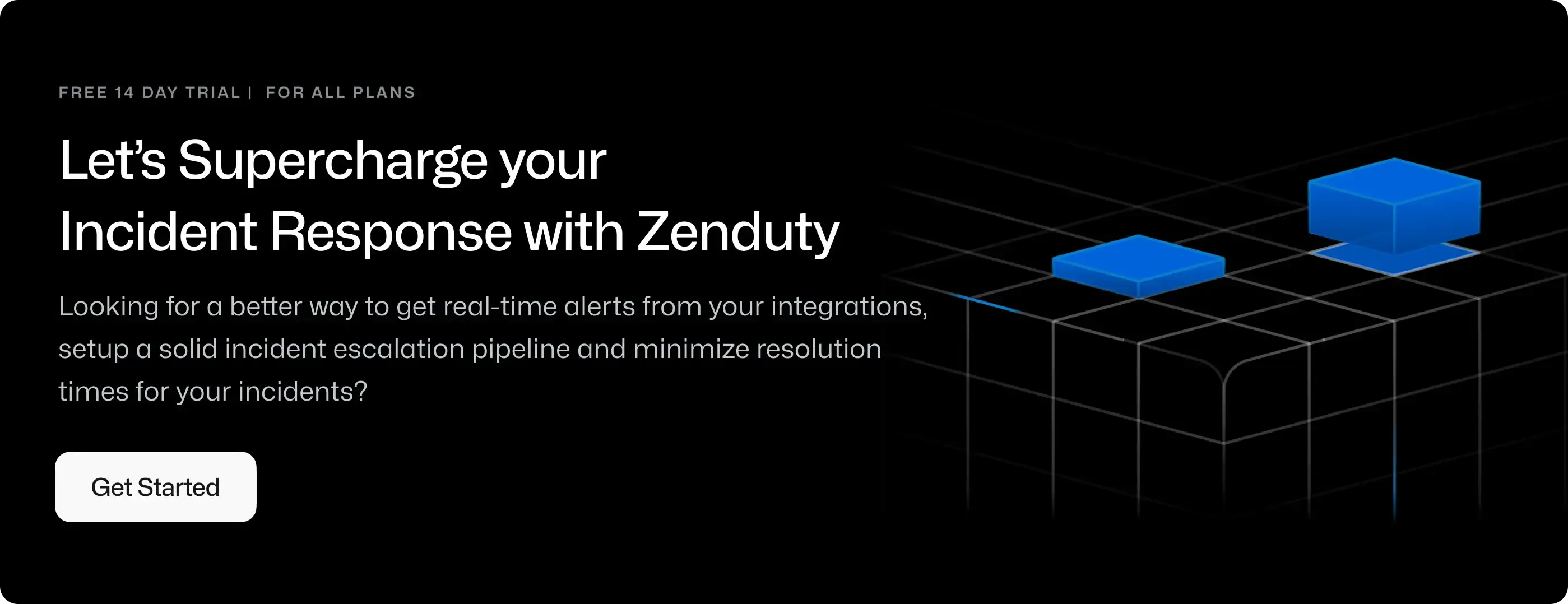Email Advanced Integration Guide
The Zenduty Email Advanced integration lets the user create a unique email address to which you can send critical emails, which will in turn create an incident on Zenduty and sequentially escalate to the right team with notifications based on on-call schedules via email, text messages(SMS), phone calls(Voice), Slack, Microsoft Teams and iOS & Android push notifications. Alerts are escalated until they are acknowledged or closed. Zenduty provides your support teams with detailed context around issues along with playbooks and a complete incident command framework to triage, remediate and resolve incidents with speed.
Email Advanced integration also allows for restrictions on the email sender, allowing only specific email senders to create an alert on Zenduty.
The Email V2 integration supports attachments which are displayed on the alert details page and the incident details page.
Acceptable attachment content types include image/gif, image/jpeg, image/png, image/jpg, image/webp, application/pdf, application/vnd.ms-excel, application/vnd.openxmlformats-officedocument.spreadsheetml.sheet, application/msword, application/vnd.openxmlformats-officedocument.wordprocessingml.document, and text/csv.
You can also use Alert Rules to custom route specific Email alerts to specific users, teams or escalation policies, write suppression rules, auto add notes, responders and incident tasks.
To create incidents via Email(Advanced) with Zenduty, complete the following steps:
-
Go to Teams on Zenduty and click on the team you want to add the integration to.
-
Next, go to Services and click on the relevant Service.
-
Go to Integrations and then Add new Integration. Give it a name and select the application Email Advanced(Beta) from the dropdown menu.
-
Go to Configure under your integrations to start with the configuration.
-
To start off the configuration of the integration, type in the Custom Email to which one would send the email to.
- The system will automatically check if the email is valid.

- The system will automatically check if the email is valid.
-
Proceed by selecting whether you want to Restrict the alert creation to specific Emails.
- Any email address entered in this list would be allowed to created an alert on Zenduty by sending the email to the previously created custom email.
- You can add any number of email addresses to this list in a comma seperated format.
-
Proceed by either enabling or disabling Regex extraction for deduplication terms from the Email Subject.
-
The Entity id of the Alert is generated from the Email Subject that is sent to the integration.
-
This Entity id can be different if the 'Triggered' term in the email subject is changed to 'Resolved', hence resulting in 2 seperate incidents created for the same alert.
-
In other words, if a previously triggered alert is marked as resolved, it would create a new incident instead of resolving the existing one.
-
By adding the appropriate regex terms, you can remove dynamic terms from the email subject line, making it possible to deduplicate alerts.

-
To help you determine which Regex to use, you can visit Regexr to optimize it for your specific needs.
-
-
Save the integration.
-
Zenduty Email Advanced integration is now complete.
Important Note:
- Please note that emails without a body cannot be processed by the integration. To ensure successful ingestion and processing, kindly make sure that every email includes a properly formatted body containing all the required information.
- If the size of an email exceeds 10MB, the email will not be processed, and the alert will not be created.
- If an attachment file exceeds 6MB, we will discard it; however, the alert will still be created without that attached file.
- The Email Advanced integration supports plain-text and HTML content types. Any other content types would create an alert but would have the message content missing.
- The default deduplication key for email alerts is the hash of the subject of the email, and therefore all email alerts sent to this integration email with the same subject will be clubbed within the same unresolved incident by default. If you want to trigger new incidents for every email alert sent to this integration email(and not collate alerts within incidents based on subject), then create an alert rule to override the entity ID as outlined here.
